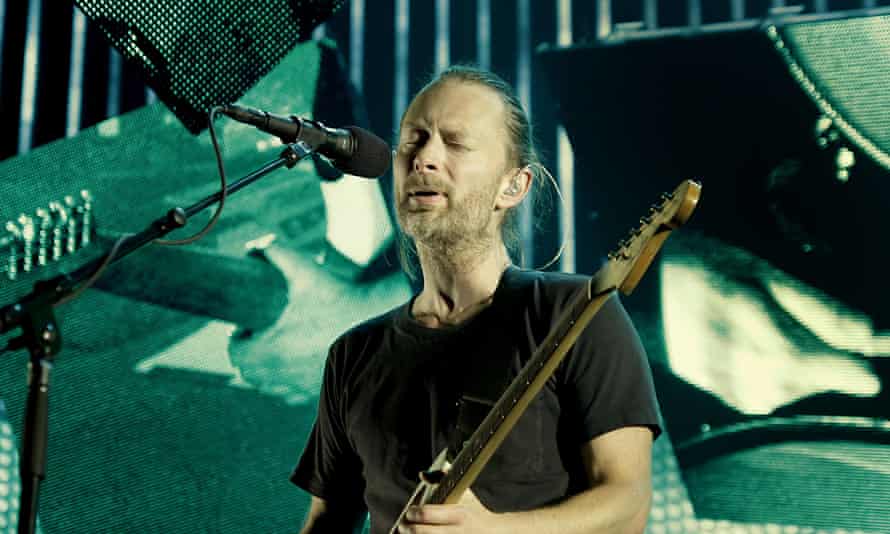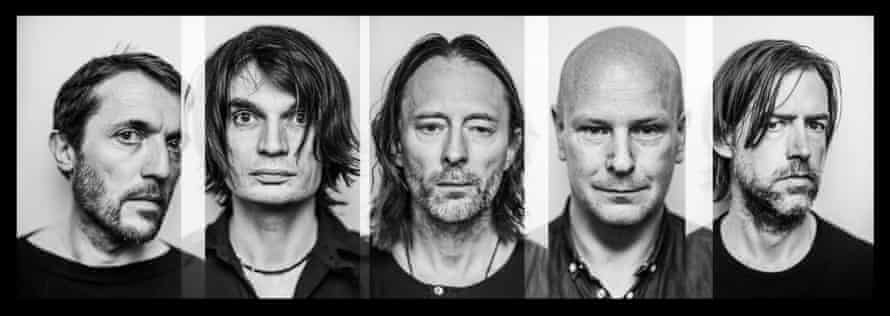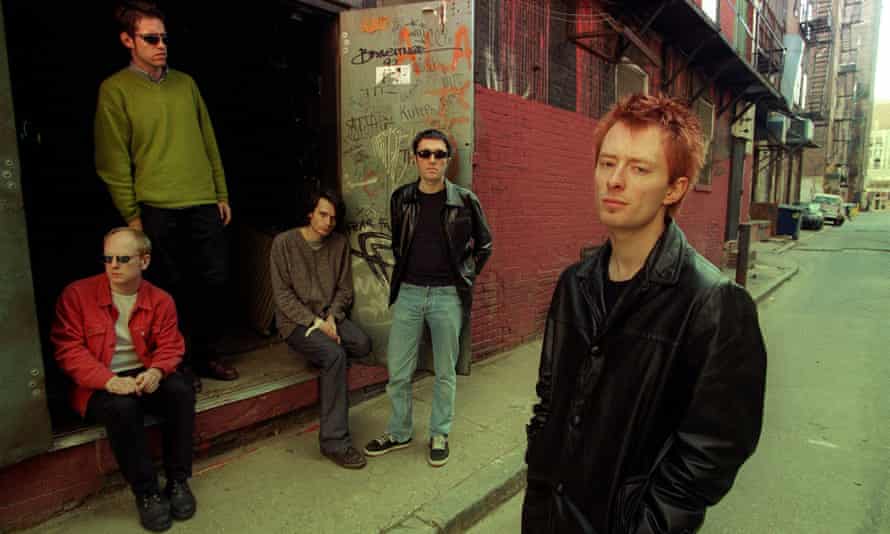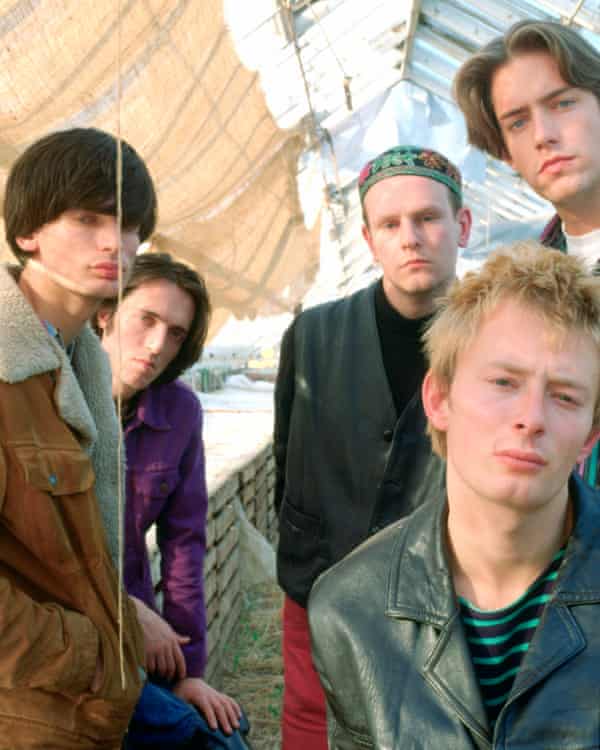And Ill Never See Them Again if I Scream to the Cops Radio Head
40. Blow Out (1993)
Save a riotous airing on 1994's Live at the Astoria, Pablo Dear's closer rarely intrudes on Radiohead lore. A shame – because information technology'south a tantalising finale: the audio of a nervous band storming the metropolis limits and glimpsing Valhalla.
39. The Daily Postal service (2011)
Alternative this weirdo jamboree from the tranquil King of Limbs was a no-brainer. As a stand up-lonely, though, it's irresistible, suggesting an unlikely kinship between Radiohead and the venerable pop carper Randy Newman: musical-theatre flair weaponised confronting tabloid hysteria.
38. Spectre (2015)
The band's rejected Bail theme has assumed the identity of a curiously viable Radiohead vocal. Thom Yorke is persuasive – if not exactly suave – in character as the secret agent, only credit Jonny Greenwood, equally we frequently must, with its emotive thwack.
37. Kid A (2000)
Driven to despair by OK Computer's runaway success, Yorke faced a perilous pick: sacrifice his sanity in exchange for astronomical fame or persuade Ed O'Brien to become into Autechre. On Child A, the second pick won out: sequestered away with Greenwood, Yorke produced much that haunts and a fiddling – like the title runway – that gleams.

36. Packt Like Sardines in a Crushd Tin Box (2001)
Afterward decrying consumerism, swerving into outre avant-rock and selling millions of records anyhow, Radiohead learned the difficult fashion that condemning society would just make them fifty-fifty richer. Trying a new tack, the Amnesiac opener layers broken-hearted ticks and gamelan-fashion chimes before gently lampooning a "reasonable man" with an uneasy censor.
35. Burn the Witch (2016)
Once the ring'south secret weapon, Greenwood is now a garlanded composer and Radiohead'south melodic powerhouse. Finally entrusted to build an arrangement from scratch, he turned the live favourite Burn the Witch into this orchestral jaunt. The iffy bout version – shorn of strings and charm – attests to his handiwork on the recording.
34. Creep (1993)
Radiohead's biggest hit is so beautiful and corny, it is impossible to accept it on its own terms. "I want you to notice when I'm not around," Yorke broods, a perfect lyric he probably hates. In the end, the ring's disavowal of the song sent its credibility full circle. Nowadays, Creep is a joke, only we're all blissfully in on it.
33. Scatterbrain (2003)
An unsung gem from Hail to the Thief, Scatterbrain prescribes halting rhythms and deconstructed chords to a narrator fretting over his identity. As birds and newspaper pages thrash in a gale, Yorke, too, longs for chaos. The tantalising, unresolved chords mock him, but enchant us.

32. Just (1995)
Post-Creep, Radiohead were poised between grunge and Britpop. Merely is a time capsule at the crossroads: hailstorm baloney meets perky hooks, wily vocals and – Yorke's mischievous challenge to Greenwood – an absurd pageant of guitar chords. The chorus flips the grunge ethos on its head, swapping self-loathing for theatrical vitriol.
31. 2+2=v (Live at Earls Court) (2004)
As the Iraq war protests floundered, Yorke sporadically logged on to radiohead.com to denounce New Labour and the warmongering "thief" in the White House. 2+ii=5 is his polemical canticle for the era of mass-broadcast deception and enhanced interrogation techniques, captured thrillingly in this Com Lag EP version.
thirty. Morn Bell (2000)
Kid A's unorthodox breakup song was later resurrected as Morning Bong/Amnesia ("like a recurring dream," Yorke observed), simply keep room in your heart for the cold-sweats original. Just a melody so blissfully innocent could withstand such jittery, nightmarish contortions.
29. No Surprises (1997)
Radiohead's most misunderstood protagonist has information technology made: the house, the garden, the heart full upward "like a landfill", the "job that slowly kills you"… and how lovely it all sounds. Can a radical conscience coexist with suburban comforts, No Surprises asks? For all that information technology soothes, this 1 is pessimistic.
28. Lucky (1995)
The Bends had vamped and snarled for the gallery, but Lucky – recorded for a War Child compilation – signalled deeper concerns and higher stakes. Creeping riffs, melodic blasts and shameless melodrama laid the background for OK Computer while cementing the band'due south partnership with the producer Nigel Godrich.
27. There There (2003)
After the divisive Kid A/Amnesiac era, Hail to the Thief's lead single felt diplomatic – no more sacrilegious than Blur'southward experiments at effectually the aforementioned time. Its hooks and arrangement were deceptively crafty, though, making its turbulent climax hard to shake.
26. Where I End and Y'all Begin (2003)
Sequenced in the mid-album swamp of Hail to the Thief, Where I End and Yous Begin is a maligned masterclass in broody synthpop. With Yorke "up in the clouds" and Greenwood making spaceship sounds, the rhythm department straps in and goes full New Guild, hurtling towards an ecstatic climax.
25. Everything in Its Correct Identify (2000)
Where OK Figurer declared "I am born again", Kid A dives straight into obfuscation: its opener'south inclement vocal gibberish more closely resembles the "unborn craven voices" plaguing the Paranoid Android. Similar David Byrne before him, Yorke had renounced his authorship to flirt with self-erasure, yielding to gorgeously sunlit synths.
24. Harry Patch (In Memory Of) (2009)
A later-career treasure, Radiohead's tribute to the last surviving gainsay soldier of the start world state of war shows how much ground they have barely touched. With but a funereal, cinematic string section for company, Yorke sends his falsetto out over the trenches, an innocent witness to "demons coming up from the ground".
23. Daydreaming (2016)
Beneath the tiptoeing pianos, Heedless is a gut-wrencher. In a lyric some have linked to his tardily long-term partner, Yorke finds himself sleepwalking "across the point of no render", earlier repeating a mournful mantra, "One-half of my life", played in opposite. The timeline matches that relationship'due south duration and, equally, the lifespan of Radiohead.
22. Subterranean Homesick Alien (1997)
Plunged into a shimmering dreamscape, Yorke observes a armada of aliens surveying humanity. What, the interlopers wonder, is up with these oddballs? In fact, it's all an excuse for Yorke's alienated narrator to ask himself: am I the trouble or is society? Radiohead be to petition for the second option; here, however, was sweet ambivalence.

21. A Wolf at the Door (2003)
Comparatively radical to some, Hail to the Thief staged a hitting-and-miss venture into a new songwriting idiom. Among the hits, far and away the zaniest runway was the album closer: a nightmarish waltz resembling a mutant Bends castoff, capped past a curmudgeonly rap most backer thugs and politicians taking cream pies to the face.
20. Like Spinning Plates (2000)
After hearing their song I Will being rewound on record, Yorke decided the backwards version was "miles better" and recast information technology as Like Spinning Plates. A complementary piano version, from the I Might Be Wrong alive album, brings its spectral beauty into focus. One time you've heard it, the original becomes indispensable.
19. Pic Soundtrack (2000)
On an album bound to futuristic threats and technologies, Motion Moving picture Soundtrack'due south melancholy harmonium, fluttering harps and rolling, beatless area propose a render to uncorrupted Eden. Tellingly, it originates from the band's youthful origins as On a Friday.
18. Weird Fishes/Arpeggi (2007)
Nigel Godrich settles into cruise control on this In Rainbows highlight, a rare haven from the ring'southward omnipresent dread. Instead, Weird Fishes/Arpeggi evokes an all-too-perfect harmony: cascading arpeggios enchant while bitty lyrics caution against the lure of false prophets.
17. Truthful Dearest Waits (2016)
Fifty-fifty when they're not facing the abyss, Radiohead songs tend to operate in its general vicinity, albeit without revealing what led at that place. But Truthful Love Waits – sketched on an earlier alive anthology and perfected 15 years afterwards – conceals nothing: the abyss, listener, is dearest. "I'd drown my beliefs to have your babies," Yorke confesses woefully, wonderfully.
16. Airbag (1997)
After The Bends, the smart money had Radiohead scaling up for festival supremacy. OK Estimator'south opener took the bait then veered left: first the encephalon-melting drench, and so ripples of funk, a sexy drum lurch and some Maxinquaye basslines. Yorke – summoned "dorsum to save the universe" – presides over the melee similar a despairing god.
15. Videotape (2007)
On In Rainbows, Radiohead's cosiest album, Videotape is refreshingly, passionately despondent. Yorke vaguely evokes horrors – surveillance-country ennui, digital isolation, the gaze of an unforgiving deity – in a death-row drawl. Then, a alter of heart: maybe it was "the most perfect twenty-four hours I've ever seen", later on all.
14. Polyethylene (Pt one & 2) (1997)
Radiohead'south greatest (although, somehow, not first) antiplastic jeremiad, this Paranoid Android B-side thrashes and struts like The Bends' glam evil twin. Far from the ham-fisted Fake Plastic Copse, Polyethylene is all malevolent snarl, billowy off the walls in defiance of eye-form ecological hubris.

13. Knives Out (2001)
The bulletproof Amnesiac debunked industry rumours that Radiohead were primed for a bankable improvement – just amid that album lay this meat-and-potatoes rocker, its scurrying riffs, mystic ambience and cannibalistic lyrics qualifying every bit glorious calorie-free relief.
12. Street Spirit (Fade Out) (1995)
Yorke once compared it to "staring the fucking devil right in the optics" and knowing "he'll become the last express joy". Street Spirit makes for a spectacular showdown – a yard, doomed surrender. If you lot need a chaser, consider another vintage Yorke quote: "If I was happy, I'd be in a fucking car advertisement."
11. Sail to the Moon (2003)
Yorke'due south lullaby for his infant son has a distinctly bad-dreams vibe near it. Someone should probably take a word. Still, his adept intent shines. "Perhaps you lot'll be president," Yorke rasps over writhing guitars. "Or in the flood, you'll build an ark and sail u.s. to the moon." For immature Noah, big sustainable footwear to fill.

10. My Iron Lung (1994)
A dig at Creep'southward annoying popularity, My Iron Lung uses catchy hooks and brawny riffs to rally against commercialisation. It risks sounding bratty – it is bratty – but from insolence they fashioned a new identity: stadium-rock agitators declaring war on hypocrisy and greed – specially their ain.
9. Exit Music (For a Movie) (1997)
Bewildering, notwithstanding, that Radiohead composed this monstrous ballad for Baz Luhrmann's 1996 flick Romeo + Juliet, partly because it's a loftier-stakes blockbuster of its ain. Yorke has never sounded gloomier, with poisonous murmurs rising to a bloodcurdling fever pitch.
viii. The National Anthem (2000)
At first conjuring arthouse delirium – improv skronk, transistor radio babble, warbling ondes martenot – Child A's jazz-stone monster morphs into an electrical storm of brilliantly layered tension. Like a Mingus requiem, The National Anthem'due south power lies in the staggering weight of what is unresolved.
7. Nude (2007)
In Rainbows' online release prompted a global listening outcome anticipated unlike whatsoever since. Three tracks in, the magic happened. Subsequently kicking around in Radiohead lore for more than than a decade, Nude had found stunning form, first by channelling Björk – choppy coos, weeping strings – and so in a finale as vivid and penetrating as dawn.
6. Idioteque (2000)
Yorke says he poured his almost stubborn anxieties into Idioteque, which may explain why this pumping society tune – a formal anomaly – feels like Radiohead's chaotically distilled superego. Ecological dread, big-tech menace and catastrophic panic prevail, but that shiver-inducing synth sample doles out propaganda for hope.
five. Karma Police (1997)
Function literary dystopia, function John Lennon in a Pixies T-shirt, Karma Police is an enduringly odd superhit: at once relatable, inscrutable and chilling. Such nuance is now Radiohead's bread and butter, but just so because Yorke learned, after much saccharine bumbling, to consolidate his bleak and mawkish impulses into i.
4. Pyramid Song (2001)
Since Kid A skimped on promo, Pyramid Song technically followed up the striking single No Surprises. For casual fans, a few surprises: lyrics alluding to Hermann Hesse'due south Siddhartha, pianoforte seemingly exhumed from aboriginal culture and a newly spiritual Yorke, pond with "blackness-eyed angels" and a shoal of exes towards some nebulous afterlife. Torture for some; otherwise, cult-making.
3. Reckoner (2007)
Rock orthodoxy holds that a bully band'south nerve eye resides in a unmarried genius – ii at a push button. Radiohead's greatest ensemble piece kills the myth for good. At starting time innocuous, Figurer unspools a total house of virtuoso performances engulfed by Godrich's winter-blanket product. It soothes and then soars.
2. How to Disappear Completely (2000)
Few admit information technology, but Radiohead'south domicile turf is the desperately uncool milieu of avant garde balladry. How to Disappear Completely, a masterpiece of the form, orchestrates a stage-fright reverie with fragments of Robert Wyatt and Penderecki. In Kid A'due south supposedly cold heart information technology is pure affirmation: melancholy and light.
1. Paranoid Android (1997)
As Britpop plunged from grace, Radiohead planted a revolutionary flag in the mountaintop. With OK Computer's salvo, they shed the pare of insurgent oddballs, ditched grungy radio rock and electrified the popular imagination. Paranoid Android draws less from contemporaries than their ancestors, notably – audaciously – within prog. The seven-minute odyssey plunders rock's then-forbidden city with burbling basslines and guitar wizardry then breathtaking nobody bothered to revoke Greenwood's daytime-radio visa. Elevated by Yorke's apocalyptic babbling and heavenly falsetto, we witness operatic scale and drama ("The dust and the screaming! The yuppies networking!") in a ludicrously catchy anthem. Paranoid Android stormed the castle and raised the drawbridge on rock's imperial era.
Source: https://www.theguardian.com/music/2020/jan/23/radioheads-40-greatest-songs-ranked
0 Response to "And Ill Never See Them Again if I Scream to the Cops Radio Head"
Post a Comment